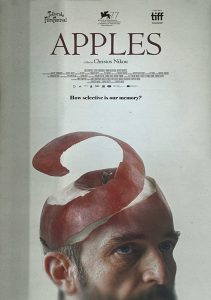‘Apples’ examines the selectivity of memory
“Apples” (“Mila”) (2020). Cast: Aris Servetalis, Sofia Georgovassilli, Anna Kalaitzidou, Argiris Bakirtzis, Kostas Laskos, Babis Makridis. Director: Christos Nikou. Screenplay: Christos Nikou and Stavros Raptis. Web site. Trailer.
Memory is a funny thing. Some recollections are recalled with the greatest of ease, while others may become fuzzy or even seem to disappear completely. Then there’s the matter of total memory loss (i.e., amnesia), whose effects can be devastating and pervasive. So it is for a growing number of residents of a major city in the quirky new Greek comedy-drama, “Apples” (“Mila”).
When a middle-aged Greek man (Aris Servetalis) wakes up on an Athens bus, he has no idea where he is or who he is. When questioned about where he was going, he has no idea. And, when he’s asked about his identity, he has no papers in his wallet. He’s a complete enigma.
This is actually not the first time that viewers see him, though. Before boarding the bus, we see him in what is presumably his apartment, from which he departs, says hello to a neighbor and his dog, and goes to a flower shop to purchase a bouquet of long-stemmed blooms. But that’s as much as the audience knows about him before seeing him waking in his amnesiac state.
The man in question – we’ll call him Aris for the sake of convenience – is not alone, either. A growing wave of amnesiac cases seems to be mysteriously sweeping Athens, with patients all over the city awakening with no knowledge of who they are, how they got to where they were found, or, in some cases, an awareness of even a basic understanding of the world in which they live, as appears to be the case with Aris.

When an amnesia patient (Aris Servetalis) enrolls in a program to help him develop a new identity, he’s required to carry out – and photographically document – a number of actions designed to provide him with new memories as seen in the quirky new Greek comedy-drama, “Apples” (“Mila”). Photo courtesy of Alpha Violet.
Like the others similarly afflicted, Aris is transported to one of several hospitals designated to treat such patients through their Troubled Memory Departments. Patients like Aris are assigned numbers (in his case No. 14842) to distinguish them until their identities can be determined. Patients whose families realize they have missing relatives generally come to claim them and take them home. But those like Aris, who apparently have no family members searching for them, become semi-permanent residents of these facilities, as their care givers realize it would irresponsible to release them without knowing who they are and lacking in basic survival skills.
Treatment measures generally prove futile, too. Some medications are administered, and memory tests are conducted to try to determine what fundamental knowledge of the world the affected have managed to retain. However, as Aris’s doctor (Anna Kalaitzidou) quickly learns, her patient is largely operating in the dark, unaware of even the most fundamental aspects of life that we all take for granted. She also discovers that his short-term memory retention is seriously lacking, prompting her to wonder how he would cope in an outside world in which he seems to possess not even the slightest sense of connection. In fact, about the only thing he seems to have any recollection of is his love of apples, which he consumes in conspicuous amounts whenever he gets the chance.
Because of his circumstances, Aris is considered to be a candidate for an experimental initiative set up by the hospital, the New Identity Program. Realizing that the candidates for the program are unlikely to recover their past memories or identities, the developers of the NIP (Argiris Bakirtzis, Kostas Laskos) engage them in a structured treatment plan to help give them new personas, something from which it is hoped they can form the basis for a new start in life. Candidates are provided with a place to live, a regular stipend and a program of actions to carry out that they are required to document with photographs. From an outsider’s point of view, the designated actions might seem rather strange – ride the bicycle of a child, intentionally crash a car at slow speed, attend a costume party wearing a distinctive outfit, pick up someone in a night club and have sex in one of its bathroom stalls – but they are all distinctive enough to leave indelible marks on the memories of the patients, providing readily recallable memories to help shape new identities. And, with the photos that document these events, the patients have handy reminders that they occurred and that they can easily look back on for memory reinforcement.

Riding a child’s bicycle is one of many “distinctive” actions aimed at helping an amnesiac patient (Aris Servetalis) forge new memories for a new identity in director Christos Nikou’s debut feature, “Apples” (“Mila”). Photo courtesy of Alpha Violet.
Upon completing one of his assignments – attending a screening of “The Texas Chain Saw Massacre” (1974) – while Aris is taking a photo of himself next to the film’s poster at the theater entrance, he meets Anna (Sofia Georgovassilli), another apparent member of the New Identity Program, though it’s not entirely clear how readily he recognizes that. They strike up a conversation and walk home from the theater together. As they stroll, she tells him the amazing true story about a film she saw in which a large ocean liner hits an iceberg and sinks, a tale that’s unfamiliar to both of them. Nevertheless, their mutual captivation with the story of the Titanic sparks a bond of sorts, and they thus begin spending time together. There’s something strange about the relationship, though, as Aris soon begins to find out.
Meanwhile, Aris grows increasingly comfortable with his new life, enough so that he’s able to maintain his home, attend to his everyday needs and carry out his assignments. He develops quite a flair for cooking, and he enjoys his visits to the neighborhood market, where the grocer (Babis Makridis) regularly makes food recommendations, particularly when it comes to the apples Aris so loves. However, when the grocer realizes that his customer is in the New Identity Program, he recommends that Aris try eating oranges instead of apples, because, he contends, they’re said to be good for the memory. Aris decides to give them a try and soon discovers the merits of that recommendation as snippets of his memory return. But he also quickly learns that those memories may involve recollections he doesn’t want to recall, especially when he finds himself going to a flower shop to purchase a bouquet of long-stemmed blooms. Indeed, perhaps it’s best that some memories are forgotten – and that they should stay that way.
Memory is something whose importance we often tend to undervalue. To be sure, we recognize its significance when it comes to the recollection of milestone events, meaningful relationships and other matters of great relevance. However, it also plays a rudimentary role in more mundane matters, like how to use a can opener, how to brush our teeth or where to buy groceries. If we were unable to recall how to do these things, we would have to struggle our way through everyday existence.

Donning an astronaut suit for a costume party is one of the required actions for an amnesiac patient (Aris Servetalis, center) in an effort to help him forge a new identity in the compelling new Greek comedy-drama, “Apples” (“Mila”). Photo courtesy of Alpha Violet.
So how exactly does memory figure into these activities? We use the memories associated with these tasks to form beliefs on how they can be accomplished. And, when we draw upon those beliefs, we use them to carry out these activities, bringing them into being in our reality. That, in essence, is how we make use of the conscious creation process, the philosophy that maintains we tap into these resources for shaping the existence we experience. This thus raises the notion, who thought memories were so important?
This is painfully evident in Aris’s case. When he loses his memory, it’s almost as if he can no longer function in some very basic ways. For example, one of the tests his doctor conducts is designed to measure his ability to associate certain types of music with specific activities. When she plays a recording of “Jingle Bells,” he’s given a stack of drawings from which he’s asked to select the one that would most readily go with the song. Needless to say, both he and his physician are disappointed when he picks the illustration of a wedding instead of a family Christmas celebration. That alone shows how pervasive his memory loss has been – and how that deficiency would obviously affect his ability to function on his own without some kind of guidance or assistance.
This is also true when it comes to Aris being able to grasp the nature of his own identity. If he doesn’t have memories of himself, he would also lack beliefs about who he is. In turn, he probably wouldn’t have any clue about what he’s proficient at, what his dreams and aspirations are, or even what he likes (except, of course, his beloved apples). How can one form the basis of a satisfying existence if one can’t even identify the rudiments of one’s own nature?
The implications of this extend beyond just individual amnesiac patients. For instance, if one has no recollections about the way the world works or one’s own personal identity, that leaves said individual open to all manner of potential manipulation. With no memories in place about such matters, one could conceivably be led to believe just about anything. It even raises the specter of being able to convince someone to unwittingly become an aberration of oneself, such as a Manchurian candidate or brainwashed terrorist. In fact, one can’t help but wonder if something nefarious is going on with the heads of the New Identity Program. Are the strange actions they require of program participants aimed at determining how far those subjects would go? It’s certainly food for thought.

Visiting a strip club and documenting the experience is one of the unusual actions required of an amnesiac patient (Aris Servetalis, right) in helping him make new memories for his new identity in “Apples” (“Mila”). Photo courtesy of Alpha Violet.
Of course, given that conscious creation enables us to manifest anything with the power of our beliefs, one might legitimately ask, “Why would anyone create amnesia in the first place, especially in light of its potentially pervasive effects?” And, in the case of this film, that applies both individually and en masse. Because the creation of such circumstances requires beliefs stemming from an underlying intent, that would mean these conditions were materialized on purpose, even if not recognized as such. Therefore, it would likely follow that those affected by this outbreak of amnesia brought it upon themselves to intentionally forget something, be it of a personal or collective nature (or possibly both). What’s being forgotten is difficult to determine, given its inherent absence, but one could speculate that it has to do with painful recollections. The loss of a loved one or perhaps a widespread social calamity are among the possibilities. Given that it’s happening on such a broad scale, though, suggests that there are many individuals looking to tune out, the exact cause of which notwithstanding.
In that sense, one could argue that the scenario presented here mirrors the ennui many of us in society are feeling these days. In a world plagued by myriad social, political and economic issues, not to mention the personal tragedies of everyday life, it’s no wonder that some of us would willingly like to forget what happened and slip into an amnesiac state. However, the danger in that is that, in our hopes of being relieved of such anguish, we might carry things too far, reaching a state where our memories are wiped so clean that we lose the beliefs that enable us to carry out everyday activities. Do we really want circumstances to go that far? If not, we’d better be careful what we wish for. Beliefs are powerful tools in shaping our existence, and, if allowed to get out of control, they can yield outcomes not to our liking – or benefit.
And what’s with the apples – where do they come into play here? It’s common knowledge that apples are a widely recognized symbol in Greek mythology and Biblical scripture, most notably as the so-called “forbidden fruit” that got Adam and Eve expelled from the Garden of Eden. According to the Bible, they lost paradise when they ate the one fruit – apples – that God forbade them to consume. This story has since symbolically come to associate this fruit with great loss, a notion that has taken up residence in the consciousness of many of us. If that’s the case, then, why would someone like Aris become so preoccupied with their voluntary consumption? Does this notion apply to him? And, if so, why would he willingly go along with it? Is there something he’s purposely trying to lose – or forget?

Director Christos Nikou is off to a fine start with this impressive debut feature. This suspenseful, nuanced and engaging meditation on the nature of memory and the selectivity of its retention will keep viewers guessing from start to finish, all the while serving up heaping helpings of wry humor and cleverly dangling clues before our eyes that may or may not prove integral to solving the mystery of this intriguing conundrum. The film mirrors the eccentricity of directors like Yorgos Lanthimos and Charlie Kaufman, presents a puzzle not unlike that found in Christopher Nolan’s “Memento” (2000) and Claire Carré’s “Embers” (2015), and successfully incorporates the kind of deadpan laughs characteristic of Hal Ashby’s “Being There” (1979). The film’s inventive, tautly composed script, written by Nikou and Stavros Raptis, deservedly captured the Chicago Film Festival’s Silver Hugo Award for best screenplay. Indeed, if this is what Nikou has to offer in his first major outing, I can’t wait to see what he comes up with next.
“Apples” has primarily been playing the film festival circuit thus far, so finding it may be a little difficult. However, given the strength of this offering, it would be a boon to movie buffs everywhere if it were to obtain a wider release. Keep an eye out for it – it’s definitely worth it.
Memory performs a function more vital than most of us realize or give it credit for. Without it, we could be irretrievably lost, not only in terms of knowing ourselves, but also in knowing our reality. As “Apples” so effectively illustrates, memory is indeed crucial to the core of our being, helping us form the beliefs that makes living our lives possible. And don’t you forget it.
Copyright © 2020, by Brent Marchant. All rights reserved.




Leave A Comment